UNIT2: CAREER AND CHOICES
Key unit competence: To use language in the context of Career and Choices
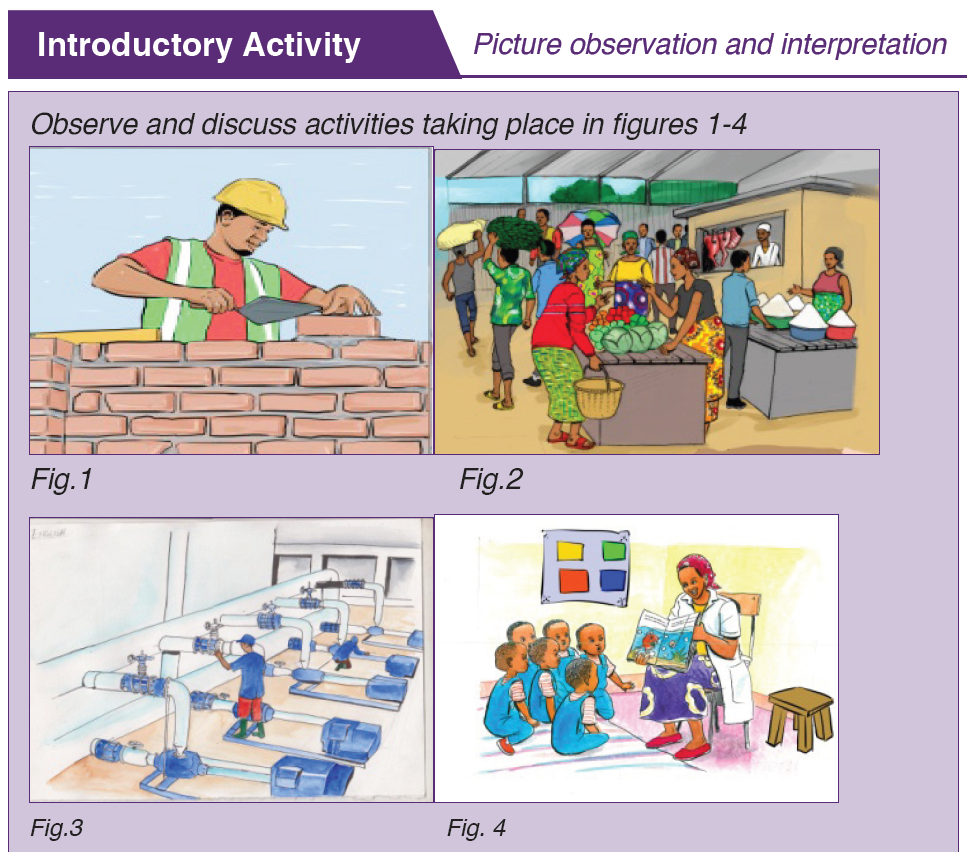
Questions for discussion
1. Identify different activities that are taking place in each figure.
2. Why do you think people do different jobs?
3. What would you do if you chose a career and found it too challenging?
2.1. Describing different types of careers and specific jobs
Picture interpretation
Observe the following pictures and discuss different types of careers and specific jobs highlighted.
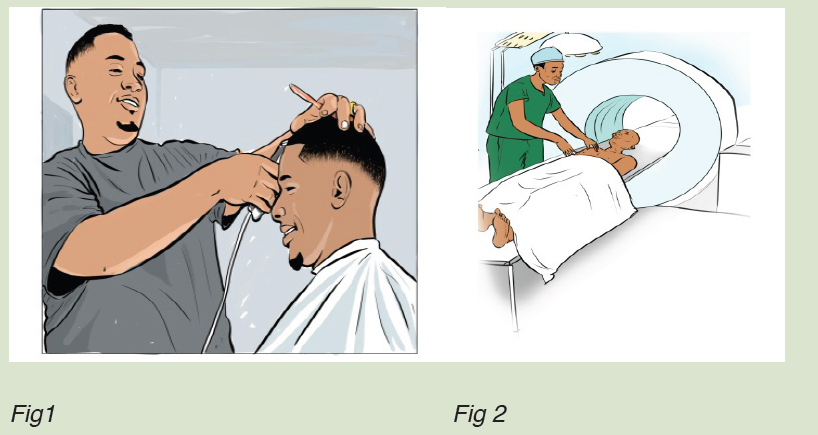
Text 1: My Job experience
• Pre-reading questions
1. Why would you choose a particular career?
2. What would you do if you chose a career and found it too challenging?
I was born in Kigali, Rwanda, and completed culinary art training in a TVET after which I went to Rubavu.
My work experience includes: Cook at Ryoherwa Hotel, Rubavu, chief cook at Serena Kigali and manager at Good life Hotel, Kigali.
From a very young age, I spent a lot of time in the kitchen with my mother who loved cooking local meals for us. I knew it was going to take a lot of hard work to be a chef but I am passionate about food and enjoy cooking as part of my life. My job involves managing a kitchen team, preparing for classes, teaching classes, television cooking demonstrations as required and some administration to ensure the smooth operation of the kitchen.
Doing something I love every day makes me feel happy. On top of that it is extremely rewarding to teach others. Also, demonstrating cooking on TV has made me so famous that everywhere I go people want me to stop and talk to them. Despite all the good things about my job, there are also setbacks. I remember one time when my fellow cook put too much salt
in the food and as the leader I had to explain how it happened. The work requires a lot of attention and time since we are dealing with high class people with different tastes, health issues and emotions. At some point in the future I would like to run my own baking business - making wedding cakes from home or start my own cookery school. I advise all high school students to find something they love and are passionate about in life and go for it.
On the other hand, my friend Umurerwa got a different experience where on her first day on the job walked into the editorial offices. It was 9.30 in the morning. For a moment she hesitated at the lift but fortunately she was unnoticed by the people seated at the their respective desks.
She took a deep breath and stepped into the office. A sudden silence descended as people looked up at the sound of her heels. She tried to relax as she walked across the floor and nodded to those who caught her eye.
My first day on the job, she thought. Then the buzzing of telephones and the hum of conversation resumed. She tapped lightly on the glass door.
“Mr. Kagabo!” The editor-in-chief came to his feet as he looked up to see Umurerwa at his door. “I was only expecting you tomorrow!” I know, but I was free and I decided to come in...”
“You’re welcome, anyway. Fred Laurence,” he introduced himself. “I am very glad to see you. My doctor has insisted that I leave by the end of next week. It is good that you have come in sooner.” “Umurerwa, you are an experienced editor. You will pick up the routine soon enough. The staffs know their jobs. Let me introduce you to the day editor.”
Umurerwa looked in the direction Fred pointed, and saw a man looking at her intently. The expression in his eyes was so malevolent that she involuntarily took a step back.
The next moment she heard a strangled sound behind her. She turned in time to see Fred collapsing at her feet, clutching his chest with both hands...
The hard work will eventually pay off even though it may feel exhausting at times.
• Comprehension questions:
1. What did the speaker in the story study and from where?
2. Describe the nature of the speaker’s work.
3. Why did the speaker choose this career and how has it benefited him/her?
4. Do you support the idea of the speaker starting his/her own business?
Give two reasons.
5. Where (in what type of business) would you expect to find an editorial office?
6. What job has Umurerwa been appointed to take over?
7. Do you think Umurerwa and Fred are going to spend any time
working together? Explain your answer.
8. What piece of advice would you give your friend regarding choosing a career after reading this story?
9. Discuss the importance of different types of careers and specific jobs
Text 2:
An occupation undertaken for a considerable period of a person’s life and
with opportunities for progress is known as a career. It is the process and
actions taken by a person throughout their lifetime in relation to his or
her occupation. One’s career is described by the jobs held, titles earned
and the work accomplished over a long period. Education and training, to
a large extent, determine the job or career an individual pursues. This in
turn determines the amount of income an individual earns. Education for
example, covers various fields.
The school curriculum gives an opportunity for learners to be exposed to
a wide range of fields at the basic level. Once they have basic knowledge
on virtually all fields, they are then able to choose areas of interest in which
they can pursue a career later in life. These choices determine what type
of education an individual gets and the kind of job he/she is likely to do. A
career plays a big role in peoples’ lives as discussed within the following
paragraphs.
In fact, be it a boy or a girl, these days’ career is given a lot of importance
in a person’s life. From the beginning itself, we are asked to concentrate on
our studies and score well in the exams. The ultimate motif of doing this is
to build a strong base and fetch good grades that would help you build a lucrative career.
Having a career is one of the most important things in life because; it’s how
money is made and a main source of income. Imagine having to wake up
every morning of everyday and then having to go to a job that you dread.
Having a career allows a person to make money doing what makes them happy, unlike a dead end job that you work doing work that’s hated. Finding a career isn’t always as easy as it sounds. While in high school or even coming
out of high school, many students are undecided on what field they want to
go into. It becomes hard trying to figure out what careers are available, what
things people are good at, and what will make a person happy and stable in life.
In conclusion, you must choose your career cautiously as various aspects
of your life are attached to it. Take your time, explore all the options, seek
advice from those you are experienced and then take a decision. Once you
choose a career, work hard so that you are able to get into the field of your choice.
• Comprehension questions
1. Explain the importance of a career and specific jobs
2. Which advice would you give to the person who wants to choose a certain career?
2.1.2. Application activities: Job vocabulary and expressions
Match the following words with their definitions and say whether the word defined is a noun, verb or both:
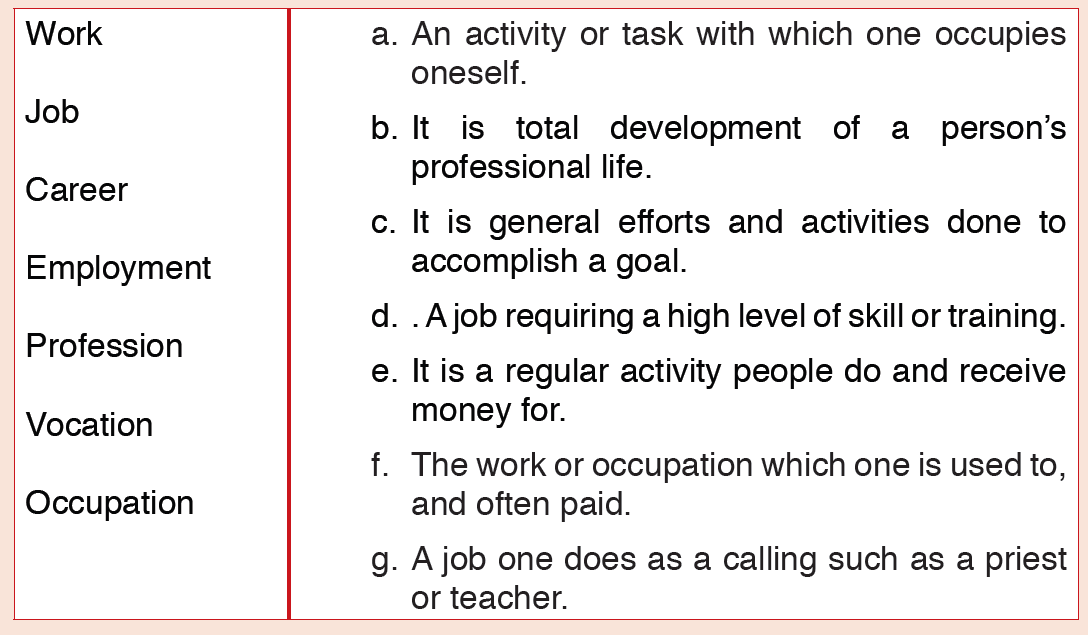
Match the following words with their definitions and say whether the word
• Complete the sentences with the words; work, job, or career
1. The reporter has done some excellent freelance____________________ for us. We should give him a permanent
___________________.
2. John is an emergency doctor. He has a very demanding______________.
3. She went shopping with some friends from ___________________.
4. Being a janitor is a dead-end ______________________ .
5. He has been on the ____________ hunt for several months, but he hasn’t found any vacancies.
6. If I were you, I wouldn’t access Facebook when you are at_________________ .
7. His father retired last year after a brilliant ___________________.
8. Working with refugee children was one of the most rewarding__________________ I’ve ever had.
9. They have been checking the ___________ listings online and in the newspapers to find a ___________
10. My sister isn’t home yet. She is still at _____________________ .
2.2. Talking about qualifications
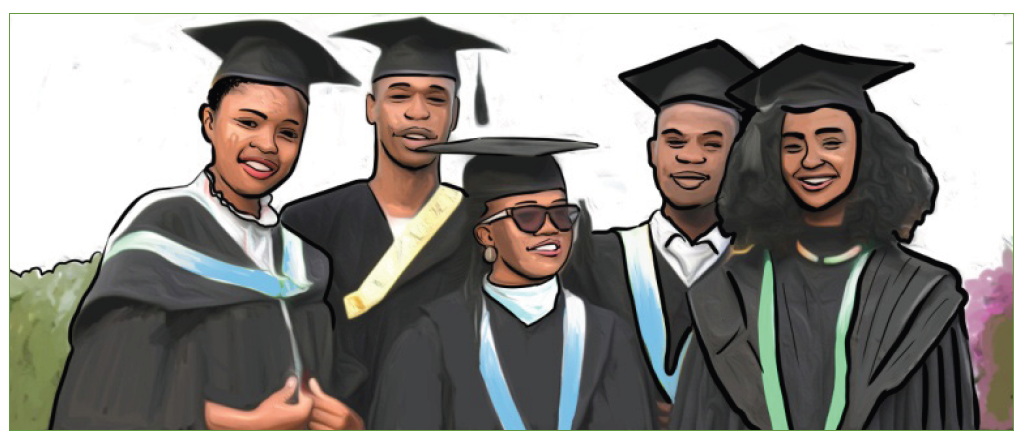
2.2.1. Learning activity: Reading and text analysis
Read the qualifications of the person below and answer the questions that
follow:
“There are as many kinds of careers as there are people. They are like
clothes, you have to choose the size and style that suits you.”
Ms. Kagoyire is a graduate with a Bachelor degree in Business Administration.
She majored in Finance from the University of Rwanda. She has by now
worked as a bank manager at Bank of Kigali for two years and she is one of
the most successful bankers in the country.
While studying this course she was so practical. She started a savings and
credit co-operative which has become a micro-finance organisations. It is
mainly women that work in this co-operative. To get a job here, one has to
be a qualified accountant with a bachelor’s degree or diploma.
When she was in secondary school, Ms. Kagoyire studied entrepreneurship
and initiated projects related to business. One of her projects called “Smart
Business Minds” won a national award and the certificate she got has made
her popular in the business community. Other business people see her
as a lady with great initiative and with plenty of ideas that can help their
companies grow.
The courses she took at university included communication and marketing.
She has demonstrated a history of meeting sales’ goals and producing
accurate, timely reports which gave her promotions and awards such as the
best employee of the year.
Ms. Kagoyire is a motivated, friendly business professional with eight years’
work experience in communications and marketing. She has the ability
to do multiple tasks, manage others, and effectively communicate while
maintaining a high quality of work.
As conclusion, as far as qualifications are concerned, for many careers you
have to have certain qualifications. For example, in order to be a doctor you
have to study for a degree in medicine. It takes about six years in order to
become a general practitioner. For some of the specialized areas you might
have to study abroad. Then, to become a nurse you have to study for a
nursing diploma at a school of nursing. There are eight schools of nursing
in Rwanda, one dental school, and one school of public health. There are
also five government schools of nursing and midwifery. It is also possible to get a nursing degree from university. In order to become a lawyer or an accountant, you also have to go to university. Again, Centers for Vocational
Education and Training teach a number of interesting skills that enable people to be employed and to start their own businesses.
They offer courses for those who wish to become plumbers, electricians, chefs and motor mechanics. These centers were established in addition to TTCs which produce Nursery and Primary teachers as their career.
People differ in what they follow in their education according to what they
expect from a career. Many people desire a high income. Some work and
hope for fame. Others want adventure. Still others want to serve people and
make the world a better place. So, think about what you want to achieve in life before you make a decision.
• Comprehension questions
1. What has Ms. Kagoyire studied throughout her education?
2. List three good qualities that Ms. Kagoyire has.
3. What is Ms. Kagoyire experienced in and for how long?
4. Give at least three achievements of Ms. Kagoyire in one paragraph.
5. Explain different ways or channels people may use to get careers.
2.2.2. Application activity: Using the present perfect tense
1. Fill in the gaps using the present perfect tense.
The world of employment....1....... (change) since the advancement of
technology. Many secretaries ....2........ (update) themselves on the use
of computer programs in order maintain their careers. However, as they
......3....... (update) themselves, software developers ......4........ (make)
new ones while others have upgraded the existing ones.
I know of a neighbour who studied computer science but ......5........
(search) for a job in almost every office and has not got one up to now.
He says they ......6...... (interview) him on programs he didn’t study.
Even those he studied, he ......7...... (not/practice) them; so he doesn’t
remember them well.
Another old man ......8........ (complain) to whoever he meets about his two
sons. He says they finished studying but they .......9....... (look) for jobs all
in vain. One son......10....... (work) in a supermarket as a salesman yet he
studied law. He is worried that he......11...... (wasted) his money on them.
He is thinking of giving them capital to create their own internet café.
2. Write a narration of around 300 words to talk about Kagoyire working
experience using your your own words.
2.3. Recounting a career
2.3.1. Learning activity: Reading and text analysis
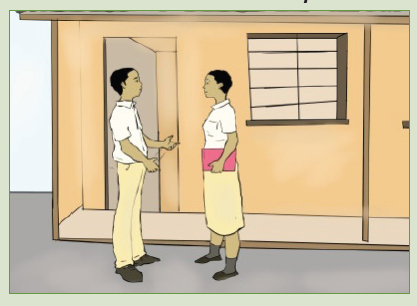
Read the dialogue below and answer the questions on it.
Keza: Ntwari. I just want you to know that I’m going to go to school to become an auto mechanic.
Ntwari: Uh what? Does Dad know about this?
Keza: Who cares? It’s my life. I really enjoy working on cars.
Ntwari: Oh, I get it. You want to study auto mechanics because of your new boyfriend. Listen, auto mechanics is a man’s job.
Keza: No, you are wrong. My boyfriend is studying electrical engineering.
Do you think everyone wants to be like you? You can’t even change a bulb.
Ntwari: Hey, that’s not fair.
Keza: My boyfriend has actually decided to study something practical in addition to law. He is also taking cookery classes.
Ntwari: Cooking? Cooking? That’s a woman’s job.
Keza: I cannot believe you still think like that. A man can be a cook, and they can do the job just as well as anybody else.
Ntwari: Uh. Let them but I won’t cook for a woman.
Keza: Sincerely speaking, my aunt has been in Kenya for three years doing engineering courses and now she is an outstanding engineer in our country.
Ntwari: Well, they can if they want to. I just think that women are better suited to be secretaries, waitresses, and piano teachers. You know.
Keza: And you have said that women can’t be farmers, carpenters, or truck drivers?
Ngabo: Oh, well, just forget this. But not to change the subject, I’m having a problem with my car, can you help me?
Keza: Forget it. Start pushing!
Ntwari: Ah! Forget the conversation and help me please?
• Comprehension Questions
1. In the past, what kinds of jobs were mainly done by men or women in your community?
2. Is this still true today, or is this trend changing? Explain
3. What are the reasons for these changes: social, religious, or economic? Explain
2.1.3. Application activities: Writing practice
1. Choose one family or community member and recount his or her career.
Explain, what the person does, how long he/she has done it,
his/her specific roles in the job and evidence to show that she/he likes the job etc.
2. Debate on the following topic:
“In the past, some people believed that Women could only be secretaries”
2.4. Describing a job in advertisement
2.4.1. Learning activity: Reading and text analysis
Pre-reading activity
Study the following a given job advertisement format and list the information required in a job advertisement.
Text: A job advertisement
Read this job advertisement and answer the questions below:
Ishema Business Co. Ltd
Ishema Business Company Limited seeks to recruit a highly qualified
candidate to fill the vacant post at our new branch in Musanze District.
Secretary
Qualification
• Bachelor’s degree in secretarial studies, Business Administration or related field
• Good command of English, French and Kinyarwanda.
• Computer literate in Microsoft office, internet, e-mail and adobe programs.
Experience
A minimum of five years’ working with international business.
Having between 20-30 years
Job requirements
• Attention to details and able to identify mistakes in documents easily.
• Ability to work extra hours.
• Organized in filing information.
Applicants should be Rwandans and attach a photocopy of their national ID and their recent passport photo.
Interested applicants can send their application letters, curriculum vitae and academic transcripts to the following email(Ishema.Co.ltd@gmail.com).
The Human Resource Ishema Business Company limited, P.O box 3434,Musanze, at the company offices.
• Comprehension questions
1. What is the vacant position?
2. Who advertised the job?
3. What does this position do?
4. What educational background is required?
5. What age is required? Why is age important when looking for an employee?
6. What computer skills are required?
7. What language ability is required? What is the importance of language for this post?
8. How can an interested person apply for the job?
9. Where can an interested person apply for the job?
Practice
Read the job advert below. Discuss the qualification and experience
required of applicants. Then write a paragraph as one of applicants.
Save the children Rwanda would like to recruit a receptionist.
Responsibilities include:
• Welcoming both local and international visitors in person or on
telephone; answering or referring inquiries.
• Directing visitors by guiding them;
• Maintaining organizational and departmental directories Maintaining
security by following procedures; monitoring logbook; issuing visitor badges.
Apply to: SCI Rwanda RT @SCI Rwanda or using Postal Address. P.O.
Box 2953. Kigali, Rwanda
2.5. Language structure: The Present Perfect and Present
Perfect Continuous
Present prefect tense
This tense connects the past with the present for completed or unchanging
actions or events. It cannot be used to make a reference to a particular point
or period (like last week, in January, at 2.am, etc.)
It is used for:
• Completed actions or events at some time before now. (no particular time given)
• Actions or events in periods of time not yet finished.
• Achievements
• Actions with ever or never with no reference to any time up to now
• Unchanging situations in periods of time up to now
• Series of completed actions up to now
• Future actions after some conjunctions: after, before, as soon as, until, for, since, this week/month/year, etc.
Generally,
The present perfect tense is used when talking about:
a) actions which took place in the past, but whose time is not precise or mentioned.
e.g. Have you been to Moscow?
b) experience.
e.g. Have you ever travelled by plane?
→ Yes, I have. No, I haven’t.
→ No, but I’m planning to.
c) news.
e.g. Our country has sent an Ambassador to DRC.
B. The use of since and for with the present perfect tense
a) Since:
NB: since is used between a moment in the past and now.
Examples:
1. The population of DRC has increased since 1970.
2. Rwanda has been independent since 1962. (this means that Rwanda
became independent in 1962 and that it is still independent).
3. His Excellence the President of the Republic of Rwanda has ruled the country since 2000.
4. You have been students here since January 2011.
b) for
NB: For is used during a declared length of time.
We are in 2019, Rwanda has been independent for 57 years.
You have been students here for one month.
Our English teacher has taught us English for one month.
• Generally, the present perfect tense is formed by the auxiliary verb
have/has + the past participle of the main verb.
• The perfect tense is used with since to indicate the beginning of a period of time.
• The present perfect tense is used with for to indicate the duration of a period of time.
The use of just, almost, already and yet.
Question: Have you written the other letter?
Different answers may be given:
• Yes, I have already written it.
• Yes, I have just written it.
• I have almost written it.
• No. I haven’t written it yet.
• No. I haven’t yet written it.
• I am still writing it.
2.6. End unit assessment
1. Put each of the following words in its correct place in the text below
Successful, engineer, lives, teens, profession, choose, interests, decisions, character, job, answer, career
It is very important for everybody to make the right choice of 1) __________.
And it is no wonder because there are a lot of honourable professions to choose
from, for example, the profession of a teacher, a doctor, a computer-operator,
an 2) __________, a journalist, an agronomist, a miner, a fitter, etc. It is difficult
for the young people of seventeen to give a definite 3) __________. There are
lots of people who take 4) __________ about their professions and their career
very easily. It is a matter of fact that only few of them become successful in their
careers and their 5) __________. Such people don’t gain much success in their
professions and their careers. The next point is that there is a big difference
between 6) __________ and career. Job is just a place to work in and to earn
your living while 7) __________ involves planning out the journey, picking up
the necessary skills along the way to be successful, and purposely deciding
what your 8) __________, skills and work values are. Choosing a career is a
hot question for school-leavers. I know that leaving school is the beginning of
my independent life, the beginning of a far more serious examination of my
abilities and 9) __________. My parents and school teachers helped me to
10) __________ my future profession. I would like to become a teacher as
my parents are. This profession is to my liking though I understand that it is a
difficult job, but I like people and my long-term dream is to bring up and teach
children. Some people never pick a career. They continue drifting from job to job,
without considering where the drifting will lead. 11) __________ may change
their career interests or goals over time, but a well-chosen career usually leads
to more advanced and challenging opportunities. And let’s face it – you’re likely
to be working most of your life, so why not enjoy what you’re doing. Finally I’d
like to advise you to choose your career carefully and then you will be happy
and 12) __________ in your future life.
Source:
https://en.islcollective.com/resources/printables/worksheets_doc_docx/writing_comprehension career/preintermediate-a2-worksheet/65054
2. Many youths in Rwanda disrespect certain jobs that require using physical energy. Write an article in your school magazine advising such students to give value to all jobs.
3. Choose the correct answer.
1. I love this writer’s books. I (have been reading / had been reading)
them for years.
2. His clothes were dirty because he (has been working / had been
working) in the garden.
3. Where have you been? We (had been waiting / have been waiting) for
you for ages.
4. He hasn’t decided on a career yet, but he (has been thinking / had
been thinking) about it lately.
5. After she (has been playing / had been playing) the violin for ten years,
she joined an orchestra.
4. Complete the sentences with the correct form of the verbs in brackets. Use
the Present Perfect Continuous or the Past Perfect Continuous.
1. Mike has never had an accident and he .......................................
(drive) for years.
2. She had no idea it was so late because she .......................................
(not / watch) the time.
3. “ ....................................... (you / take) your medicine regularly, Mrs
Smith?” “Yes, doctor.”
4. They eventually found the dog after they .......................................
(look) for it all night.
5. How long ....................................... your father .....................................
.. (work) for the company when he retired?
5. Complete the sentences with a suitable word or expression from the following:
for, by tomorrow, so far, the week before, since
1. Our TV hasn’t been working .......................... last week.
2. The Browns invited us to dinner although we had only met ......................
3. They will have finished painting the house .........................
4. We had been writing .......................... nearly an hour when the bell rang.
5. They have interviewed three suspects ..........................
